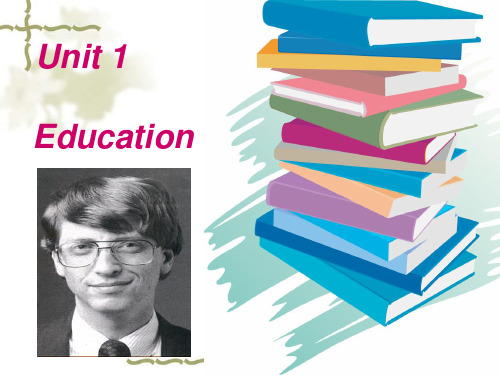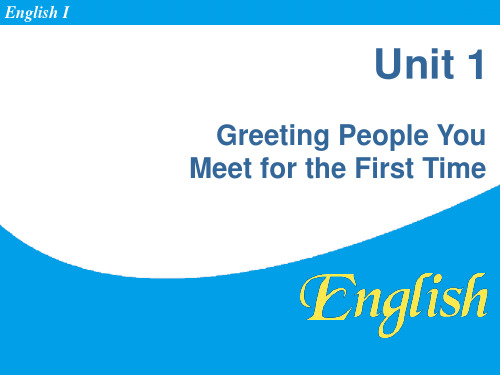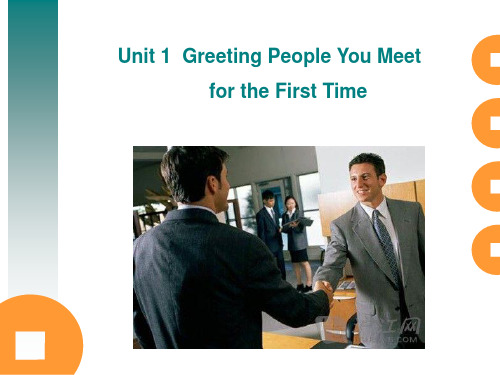高职大学英语课件Unit1(第5、6学时)
高职高专核心英语综合教程上册Unit 1 College Life-PPT课件

Unit 1: College Life
上海交通大学出版社 《高职高专核心英语综合教程—上册》
Background References
Since the implementation of reform and opening up, the reform and development of higher education have made significant achievements. A higher education system with various forms, which encompasses basically all branches of learning, combines both degreeeducation and non-degree education and integrates college education, undergraduate education and graduate education, has taken shape. Higher education in China has played an important role in the economic construction.
language lab playground
classroom
dormitory
dining hall library
gymnasium
stadium
上海交通大学出版社 《高职高专核心英语综合教程—上册》
Part I : Speaking Activity
New Words & Expressions
上海交通大学出版社 《高职高专核心英语综合教程—上册》
高职高专新视野大学英语1 unit1 课件

21
count
Every
minute counts.
每分钟都很重要。
22
They want to know what to study, or … what + to do : wh-word +to do ( 宾语,功能等 于宾语从句) 。 还可做宾语, 主语, 同位 语。 How to improve their English is often discussed among the students. = How they can improve their English is often discussed among the students.
13
Rule 9 Life is not divided into semesters. You don't get summers off and very few employers are interested in helping you FIND YOURSELF. Do that on your own time.
如果你陷入困境,那不是你父母的过错,所 以不要尖声抱怨我们的错误,要从中吸取教 训。 11
Rule 7 Before you were born, your parents weren't as boring as they are now. They got that way from paying your bills, cleaning your clothes and listening to you talk about how cool you thought you were. So before you save the rain forest from the parasites of your parent's generation, try delousing the closet in your own room.
高教版英语1(高职高专版)(第三版)课件unit 1

Unit 1 Greeting People You Meet for the First Time
Aims and Requirements Language Focus
Focal Function and Patterns
3) Hi! How are you? Hello! How are things with you? Hey! How are you doing?
English I
Unit 1
Greeting People You Meet for the First Time
职高英语第一册Unit1_Greetings_and_Introductions(课堂PPT)

Task 5
Role Play 角色扮演
➢Role A Zhang Li greets the teacher in the morning. ➢Role B The teacher replies. ➢Role A ZhangLi greets a classmate in the afternoon. ➢Role B The classmate replies.
1. introduce oneself 自 我介绍
2. introduce A to B 把A 介绍给B
greet [grɪːt] v.
say hello to sb 打招呼,问好 Can you greet people in English?
你会用英语打招呼吗?
greet people in English
Summary
A
B
Homework
1. 抄写单词十遍,加上中文意思,准备下次课听写。 2. 背诵Task 3 句型。 3. 完成练习册p1-3练习。
➢ boss [ bɒs]
负责,管理
➢ a person who is in charge of others at
work
➢老板,头目
➢ This iΒιβλιοθήκη my boss, Mr Zhang.
➢ 这是我的老板张先生。
➢computer [kəmˈpjuːtə ]
➢an electronic device for storing and processing
用英语打招呼
spell [spel] v.
How do you spell your name? 你的名字如何拼写? Spell the word,please.
高职高专实用英语教程课件-Unit 1

• have the Indian sign on • 用魔法迷住...; 对...施以魅力
• • • • make a sign to 对...作暗号[打手势] show a sign of 现出...的样子或形迹, 有...的征兆 sign and countersign 口令的问答; 暗语, 暗号 bear the sign of the times 带有时代的特征
• Many children start their education at the age of three or four at a nursery school or in the nursery class at a primary school. Education in the UK is compulsory for every child between the ages of five and sixteen. Both Pre-school and compulsory educations are provided by two kinds of schools: free state-funded schools and fee-charging independent schools. Significant numbers of international students
• • • • •
OverOver-burden Over-charge Overcome overdo
page
• The tournament added a brilliant page to the history of world table-tennis • Paging Grey Wood, would you go to reception please? • 格林伍德先生,请到服务台去一下 • Mr. Black is being paged. • 有人在叫布莱克先生的名字要找他
高职英语(一)课件Unit 1

Answer the following questions according to Passage A.
1. Who is introducing the English Professor? Miss Wang, who is the secretary of the English Department.
是的 you here. Lizzy: That’s very kind of you.
为…做好 准备的
Li: You are welcome.
常见英文初次见面习惯用语:
1. Hi. I’m Li Ming. 2. Nice to meet you. 3. How do you do? 4. My name is Li Ming. What’s your name?
专家
11. author
作家
12. a dozen
许多;十二个
13. pleasure
荣幸之事
14. clap
鼓掌
Passage A Welcome
(Miss Wang is the secretary of the English Department. Now she is introducing professor Helen Waters to the students.)
airport.)
海外的
பைடு நூலகம்
Li: Hi, you must be Lizzy. I’m Li Hong from the technical school.
旅途
Lizzy: Oh, how do you do, Li Hong? Thank you for coming to meet me.
职高英语基础模块上Unit1精ppt课件

friend in hospital. 4. The boys are going to play b_a_s_k_e_tb_a_l_l (篮球) in the
afternoon. 5. My brother looks _h_a_n_d_s_o_m_e_ (英俊的) and healthy.
C. are
D. has
8.There are ____ books in the bag.
A. no
B. not C. no any D. any
.
1. Our school _l_ib_r_a_ry_ (图书馆) is in a new building. 2. She graduated from a _v_o_ca_t_io_n_a_l_ (职业的) school
building classroom∕u∕ floor library
reading room playground basketball blackboard chair
bedroom
v.建造 build n.实验室 lab n.班级 class n.宿舍 dormitory n.餐厅 dining-hall n.途径 way n.足球 football n.书桌 desk n.座位 seat n.男人 man
.
You are my sunshine, my only sunshine. 你就是我的阳光,我唯一的阳光 You make me happy when skies are gray. 当天空乌云密布时是你使我快乐 You'll never know dear, how much I love you. 亲爱的,你从未明了,我是多么的爱你 Please don't take my sunshine away. 请别带走我的阳光
高职英语第一册课件

Book1 Unit 1 Nice to meet you!(第一课时教学设计)一、学情分析本单元是新生入学的第一单元,教学重点是活用招呼用语、相互了解个人基本信息、制作个人名片、学习不同职业的表达与描述以及练习发音。
就学习英语而言,职业学校的许多学生是胆大心粗,能说不会写或写不到位。
因此,教师在教学过程中应充分利用学生的特点开展相应活动。
我们可以利用学生胆大、敢说的特点,充分利用头脑风暴法采集相关素材,开展如招呼用语集锦、刨根问底探隐私、名片栏目大荟萃等活动。
教学中名片栏目的设计、描述不同职业、圆润的发音是本单元难点。
圆润的发音要靠长期的示范与坚持来实现。
名片中各栏目的设计可以集体讨论商定,个人名片设计则可以体现个性化、专业化,并决出最佳名片设计奖,教师还可以请学生一起收集生活中的名片,探讨名片的基本要素和个性特色。
职业的描述教师可以借助体态语、道具、图片、视频等来推进,还可以设计相应的练习强化学生的认知。
本单元设计分为4个课时:第一课时 lead-in + listening and speaking第二课时 reading and writing第三课时 language in use + vocabulary consolidation第四课时 unit task + pronunciation practice第一课时 Lead-in + Listening & Speaking二、教材分析1.教学内容本课时系教材《英语1》(基础模块高教版)第一单元的第一课时,包括Lead-in & Listening and speaking两部分,具体内容为:招呼用语,听懂并掌握询问和提供个人信息的词汇、句型。
2.教学重点、难点⑴教学重点招呼用语,听懂并掌握询问和提供个人信息的词汇、句型⑵教学难点个人信息的词汇、句型三、教学目标1.知识目标⑴掌握与个人信息相关的词汇,如name, first name; last name; name card; telephone number; age; address; e-mail address; job (engineer; manager; secretary; teacher; student; doctor; nurse; singer; fans); position(boss);⑵掌握提供或询问个人信息时所使用的句型,如:1) about greeting:Good morning.Hi.Nice to meet you.2) about personal informationWhat’s you name?Where are you from?Which company are you from?2.能力目标⑴学生能听懂关于询问和提供个人信息的对话。
- 1、下载文档前请自行甄别文档内容的完整性,平台不提供额外的编辑、内容补充、找答案等附加服务。
- 2、"仅部分预览"的文档,不可在线预览部分如存在完整性等问题,可反馈申请退款(可完整预览的文档不适用该条件!)。
- 3、如文档侵犯您的权益,请联系客服反馈,我们会尽快为您处理(人工客服工作时间:9:00-18:30)。
Ⅲ. Exercises Focusing on Sentence Structure
2. 用于引导让步状语从句 Whatever we said, he’d disagree. We’ll go along together whatever happens. Don’t lose heart whatever difficulties you meet. Whatever happens, the first important thing is to keep cool.
whatever的用法: whatever有两个用法,一是引导名词性从句(如主语从 句、宾语从句、表语从句),二是用于引导让步状语从句。 1. 用于引导名词性从句 Whatever she did was right. Give them whatever they desire. You may do whatever you want to do. One should stick to whatever one has begun. College students are seen doing whatever work they can find.
exercises behind it. 1. Exercises (Text Book): P.8-10. 2. Exercises (Workbook): Ex. 10-Ex. 13. 3. Preview Unit 2 Learning English: Some Advice
and Suggestions.
4. 因此,在开始你的大学生涯时,请下定决心好好学习。
Ⅲ. Exercises Using Topic-related Terms
1) education 2) graduate 3) set goals 4) taking / doing a course 5) get a certificate / grade 6) taking other subjects / courses 7) getting a grade / certificate
a lot. 4. I have learnt one thing: never let your friends down.
Ⅲ. Exercises Translating
B: E-C 1. 的确,会有很多人帮助你,但是无论你决定做什么? 你常常得自己走出第一步。 2. 作为老师,我总是告诫我的学生从第一天开始就努力奋 斗、积极向上。 3. 为了你的大学生活过得充实丰富,你应该充分利用即将 得到的机会。
Ⅲ. Exercises Focusing on Sentence Structure
whatever还可用于加强语气,相当于what ever, what on earth等。如: Whatever is the matter? 这是怎么回事? Whatever does he mean? 他到底是什么意思? whatever从句有时可以省略。如: Whatever your argument, I shall hold to my decision. 不管你怎样争辩,我还是坚持自己的决定。
3. Just read something to kill time, a book, magazine, newspaper, or whatever.
Ⅲ. Exercises Focusing on Sentence Structure
unless的基本用法: 连词unless意为“除非……如果不……”,“除了……”, 多引导一个否定意义的真实条件句,有时也可引导非真实 条件旬。unless引导条件句时,主要用于下列情况。 (1)主句为肯定句。 [例] You will miss the bus unless you hurry up. (2)主句为否定句。 [例] You will never get anywhere unless you have set your goal.
Thank you for your attention!
Ⅴ. Summary
1. Master the usage of “whatever” and “unless”;
2. Understanding and filling in registration forms.
Ⅴ. Homework
1. Read the text of Section B and finish the
Ⅲ. Exercises Focusing on Sentence Structure
B: 1. I will leave at 9 unless you want to go earlier. 2. Unless he lets me use his bike, I won’t let him use
Ⅲ. Exercises Focusing on Sentence Structure
A: 1. You can take whatever you like from the gifts. 2. The students are free to ask whatever (questions)
they want to.
Ⅲ. Exercises Basic Writing Skills
1) SPC 2) SPOO 3) SPO 4) SPA 5) SPOC 6) SPOA 7) SP 8) SPOC
Ⅳ. Section C Practical Writing
Notes on the sample
Title: 称呼,即称先生、小姐,还是夫人,据此能确定填 表人的性别。 Family name (Surname): 姓 Given name (First name): 名 Date of birth: 出生年月,按日、月、年的顺序填写。 Home address: 家庭地址。从门牌号码、街道名、城市 名、国家名到邮政编码,按顺序依次填写。 Country of birth: 出生国,即在哪个国家出生。 Nationality: 国籍,即现在是哪个国家的公民。注意:此 处应用国名的形容词形式,如British,Chinese,French, Spanish,而不是Britain,China,France,Spain。
Unit 1 Going to College
Ⅰ. Review
Words and phrases dictation.
Ⅱ. Objectives
1. Master the usage of “whatever” and “unless”;
2. Understanding and filling in registration forms.
my computer.
3. Unless something goes wrong, I’ll see you next week.
Ⅲ. Exercises Translating
A: C-E 1. Did you have a great time at the party last night? 2. This term she has taken courses in English, computers/computing, and driving. 3. He has a debt to his friends who have helped him
Ⅲ. Exercises Reading Out
1) be 2) whatever
3) on
4) though 5) set 6) until
Ⅲ. Exercises Getting the Message
1) A 2) B 3) C 4) Dng the Right Word
1) A
2) C 3) B 4) A 5) C 6) A 7) D
8) A
Ⅲ. Exercises Working with Expressions
1) of
2) at 3) down 4) up 5) by
6) on/upon
7) up
8) To
Ⅲ. Exercises Focusing on Sentence Structure
